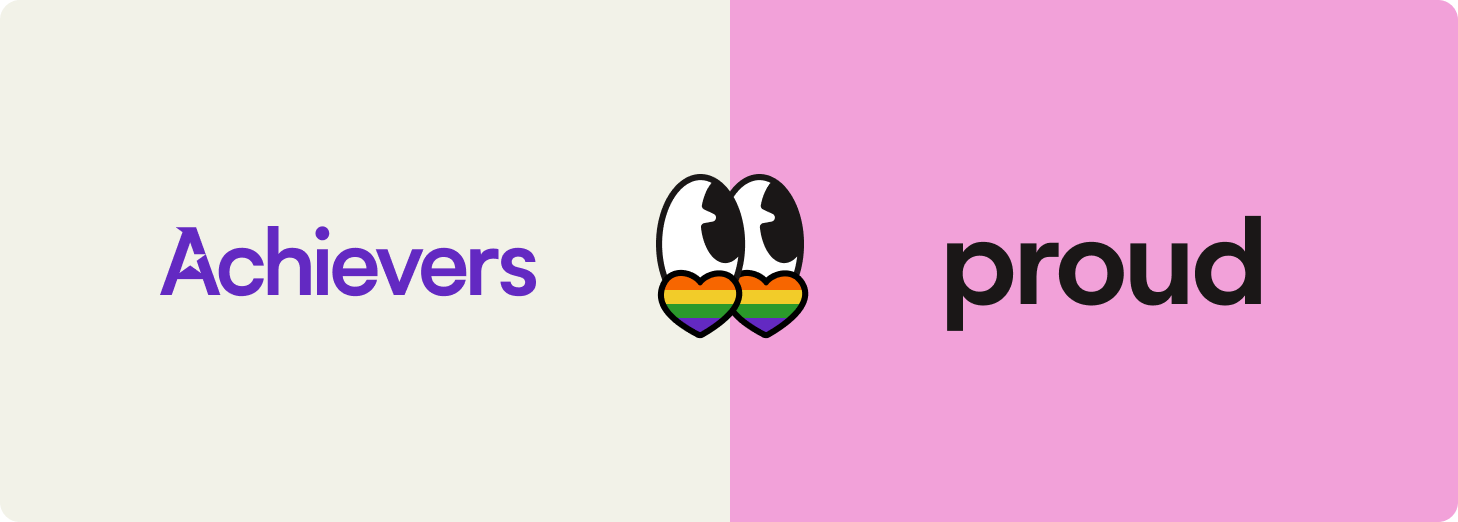Table of contents
Celebrating Pride Month at work is an opportunity to turn inclusion into something people can actually feel. Plenty of companies mark the occasion each June, but it often stops at surface-level celebrations. And while those moments matter, inclusion takes more than a flag in the break room or a social post. It takes consistency, care, and showing up in ways that truly support your people.
When employees don’t feel accepted at work, they don’t show up as their full selves. They edit their words, second-guess ideas, and shrink themselves to fit in. That silence doesn’t just affect individuals — it holds back teams. With 4.4% of Canada’s population and 9.3% of the U.S. population identifying as LGBTQ+, this isn’t a small corner of the workforce.
Celebrating Pride Month at work can reinforce an inclusive culture, but it must be done with care, intention, and follow-through. And it starts by understanding what Pride really means — and why it matters.
What is Pride Month?
Pride Month honors the history, resilience, and contributions of the LGBTQ+ community. It traces back to the Stonewall Uprising in June 1969, when members resisted a police raid at the Stonewall Inn in New York City. That moment sparked a broader movement for LGBTQ+ rights and visibility. Today, Pride Month is a time to reflect, celebrate, and continue advocating for inclusion and equality.
In communities around the world, Pride Month is filled with community events, parades, drag shows, concerts, and more. But its presence in the workplace matters too. Pride Month is a meaningful opportunity for organizations to amplify LGBTQ+ voices, encourage understanding, and create a culture where everyone feels they belong.
When is Pride Month?
Pride Month is honored every June, recognizing the LGBTQ+ community’s ongoing fight for equality and representation. Around the world, companies and communities host events that promote acceptance, celebrate diversity, and support inclusion in all forms.
Countries that recognize Pride Month in June include the United States, Canada, the United Kingdom, Japan, Germany, Australia, France, Spain, and many more — making it a truly global movement that goes beyond borders and backgrounds.
Why Pride Month at work matters
Pride Month is a powerful opportunity to show your values in action and create space for everyone to feel safe and supported. For many, that support still isn’t guaranteed — Achievers Workforce Institute’s (AWI) Impact Series found 40% of LGBTQ+ employees surveyed say there’s no one at work they can have tough conversations with.
That’s not just a gap in communication — it’s a barrier to trust and belonging. Pride Month gives organizations a moment to recommit to inclusion — not just symbolically, but meaningfully.
Here’s why it matters:
- Belonging fuels performance: People do their best work when they feel valued
- Visibility creates trust: Inclusive policies and open conversations matter
- Everyday actions add up: From pronouns to inclusive benefits
- Recognition shapes culture: Inclusion grows when it’s acknowledged
- June is a starting point: Use it to build lasting change
4 ways to meaningfully celebrate Pride Month at work
Pride Month is a chance to show your people what inclusion looks like in practice. For HR leaders, it’s a key moment to build trust, reinforce your values, and lay the groundwork for a culture where everyone feels safe, supported, and seen. The actions you take now can shape how your people experience belonging all year long.
Here are four ways to make that impact count:
1. Educate with intention
Most companies have DEI programs in place — but employees still aren’t feeling the impact. According to the WomenTech Network, 89% of employers offer DEI initiatives, yet 62% of employees say it’s not enough to create a truly supportive workplace. Pride Month is a chance to change that by offering education that’s thoughtful, personal, and rooted in real experiences.
Ways to bring it to life:
- Host a lunch-and-learn with members of your LGBTQ+ Employee Resource Group (ERG)
- Invite a guest speaker to share their story and answer questions
- Share a Pride history spotlight weekly during the month
- Offer reflection prompts or guided discussion topics
- Partnering with your EGR to create reading or viewing lists
2. Inspire through connection and celebration
Pride Month is a chance to bring people together in meaningful, joyful ways. Interactive activities like Pride-themed trivia can spark learning and connection — especially when paired with thoughtful rewards or team recognition.
But celebration isn’t only about performance. It’s also about presence. Volunteer days, shared experiences, and inclusive events show that your commitment to DEI lives beyond policies and into everyday culture.
Ways to bring it to life:
- Host a Pride trivia game with questions tied to history and flag symbolism
- Offer personalized Pride-themed company swag to recognize event contributors
- Spotlight stories or photos from past Pride Month events
- Organize team volunteer opportunities with LGBTQ+ nonprofits
- Create space for remote teams to join in celebrations
3. Lead with empathy and trust
Pride Month is more than a celebration. It’s a moment to ask whether your culture truly supports everyone. For LGBTQ+ employees, that support often hinges on leadership. But the reality is, only 1 in 5 managers say they’ve been trained to navigate tough conversations — the kind that builds trust, shows empathy, and signals that it’s safe to be yourself at work. Pride Month is a chance for leaders to reflect on how they’re showing up in both public and private moments.
Ways to bring it to life:
- Provide inclusive leadership and communication training for managers
- Encourage leaders to show visible, ongoing support for LGBTQ+ inclusion
- Make space in check-ins to talk about well-being, not just work
- Normalize the use of pronouns and inclusive language
- Create anonymous channels for feedback and honest dialogue
4. Empower through recognition
Recognition is one of the most powerful tools HR leaders have to reinforce belonging — and it’s especially meaningful during Pride Month. Our research shows employees who are recognized frequently are 2.2x more likely to say they feel a strong sense of belonging. That kind of validation goes a long way in helping LGBTQ+ employees feel seen, supported, and appreciated for who they are.
Ways to bring it to life:
- Use your recognition platform to highlight inclusive actions
- Encourage peer shout-outs during team meetings or on internal channels
- Tie recognition to your values — especially those around belonging or respect
- Feature stories of Pride-related impact in your company newsletter
- Celebrate ERG members and Pride organizers for their time and energy
How Achievers celebrates Pride Month (and beyond)
1. Live your values — every day
At Achievers, our values guide how we support each other and the communities we belong to. During Pride Month, those values come to life in visible, intentional ways.
We live “It’s the people” by celebrating the stories, contributions, and lived experiences that make our culture stronger. One team reminds us to show up for each other with honesty and care. And Be bold pushes us to keep advocating for equity and progress, even when the work is hard.
That’s why initiatives like “Who I Celebrate”, which featured heartfelt employee tributes and recognition stories, matter. They reflect a culture that doesn’t just talk about belonging — it actively creates it.

2. Spotlight on Achievers Proud ERG
Achievers Proud is a powerful part of how we bring inclusion to life. This ERG creates space for LGBTQ+ employees and allies to connect, be seen, and lead real change — from hosting events like Trans Visibility Day, Pride Throwdown, and ally certification courses, to launching Proud-branded swag and creating meaningful campaigns like Who I Celebrate.
They also guide internal policies, collaborate across other ERGs, and help shape how we show up in the world — including our partnership with Pride at Work Canada, which expands our reach and reinforces our commitment to inclusive hiring.
Thanks to their work, Pride at Achievers feels honest, heartfelt, and rooted in the people who live it every day.
3. Build inclusion into communications
Representation matters — not just in what we say, but in who we choose to amplify. At Achievers, we’re intentional about giving visibility to the voices that shape our culture, including the members of our ERGs.
Our company page highlights the work of our ERGs year-round, helping showcase the people and perspectives that make us stronger. We elevate our Pride at Work Canada partnership, where we tap into resources, leadership programs, and inclusive hiring channels that help us better support our LGBTQ+ employees.
4. Share stories, spark learning
One of the most meaningful ways to celebrate Pride is to make space for people to be seen and heard. At Achievers, we highlight the voices that shape our culture — through guest speakers like Olympian and PWHL Ottawa captain Brianne Jenner, employee-led campaigns and socials, and storytelling that brings personal experiences to the forefront.
These moments help people connect, challenge assumptions, and understand what inclusion really looks like at work.
We also ground Pride Month in education, with past seminars on the Stonewall Riots and the history behind Pride — creating space for employees to learn, reflect, and ask questions. These conversations go beyond surface-level celebration and help build a workplace where curiosity, empathy, and care are part of the everyday.
Living your values beyond Pride Month
Pride Month may be one moment in the calendar, but its impact should carry well beyond June. When companies lead with care, listen deeply, and celebrate meaningfully, they help build a culture where employees feel safe to show up as they are — not just during Pride, but every day.
Belonging grows through consistent, everyday actions — the stories we share, the space we hold, and the ways we recognize each other for who we are and how we contribute.
At Achievers, we help organizations show up for their people with a recognition platform that’s woven into the flow of work — thoughtful, timely, and grounded in values. It’s one of the simplest, most powerful ways to build real connections across your workplace, during Pride and every day after.



